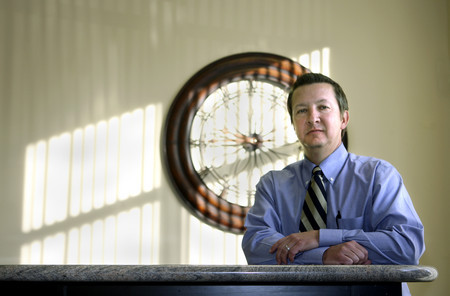Sarbanes-Oxley Act on trial
Brad Beckstead, owner of a small certified public accounting firm in Henderson, figures a regulatory organization singled him out as a "poster boy" for allegedly inadequate audit practices.
Beckstead and his attorneys, however, hope to persuade the U.S. Supreme Court to make the Public Company Accounting Oversight Board the symbol of excessive regulation.
The high court will hear oral arguments in the case on Monday, and Beckstead's attorneys hope to get a ruling by July.
The board, which is appointed by the Securities and Exchange Commission, was set up under the Sarbanes-Oxley Act of 2002. The law was enacted in the wake of national outrage over scandals at Enron Corp., WorldCom, Tyco and Global Crossing.
The Supreme Court case pits advocates of limited government who say excessive regulation is stifling businesses against those who say even small public companies need tough accounting standards so investors can make informed decisions.
Beckstead said he supports additional regulation for giant public corporations, which often have investments from pension funds. But the auditor said the government shouldn't require the same level of auditing procedures for small startup companies, in which individuals typically invest small sums with knowledge of the risks.
"It's like shooting a gnat with a bazooka," Beckstead said. "It just makes no sense."
The accounting firm owner said the board ordered him to conduct audits so extensive that most of his 60 clients, small companies with shares traded on the Over the Counter Bulletin Board, couldn't pay his bills.
All but about two of the startup companies he worked with were forced to go out of business or they moved their shares to foreign stock exchanges in Canada, London or Hong Kong, Beckstead said.
"I just believe that I was picked to be the poster boy (of bad small-company auditing), because I am from Las Vegas," he said, "Because we're a bunch of cowboys right here that don't know what we're doing or we're con artists."
He employed 10 certified public accountants at his firm's peak, but Beckstead said he was forced to lay off workers and now has only two employees. Revenues at the firm dropped from about $1 million annually a few years ago to $100,000 now. He supplements audit work with consulting services for small public companies.
Not only did the board undermine his business, but it stifled entrepreneurial spirit and innovation, Beckstead said.
Martin Lobel, legislative aide for the late Sen. William Proxmire, takes the opposite position.
Lobel said he doubts the board singled out Beckstead for regulatory punishment to make an example of him.
The board needs independence to protect it from the kind of political interference that has prevented the government in the past from requiring full and complete disclosure to investors, Lobel said.
Lobel said large banks and giant corporations could use their political influence to undercut regulatory standards and have done so in the past.
"Nobody (at public companies) wants good accounting standards because it requires them to show their losses," Lobel said.
Although compliance is costly, the standards provide investors with better information about profits, cash flow and other financial results, Lobel said.
That helps boost the public 's confidence in financial reports from over-the-counter companies and makes it easier for these small companies to attract investors, he said.
The Supreme Court case focuses on a narrower question: Does the law violate the constitution?
Beckstead and the Free Enterprise Fund say that Sarbanes-Oxley violates the constitution by preventing the president from removing the accounting board's members. Their attorneys at law firm giant Jones Day argue the law conflicts with the "separation of powers" doctrine by limiting the president's power over the board and enhancing Congress' power over the board.
Attorneys for the board disagreed, saying Congress may give departments appointment powers for "inferior officers," such as the auditing board members.
The district court and District of Columbia Court of Appeals sided with the board, but the Supreme Court will have the final word.
Contact reporter John G. Edwards at jedwards @reviewjournal.com or 702-383-0420.

















